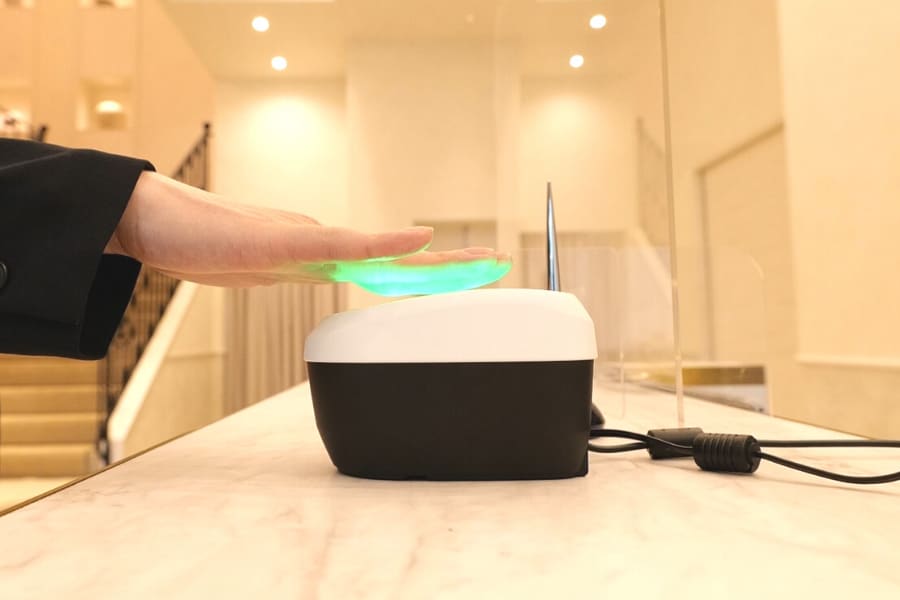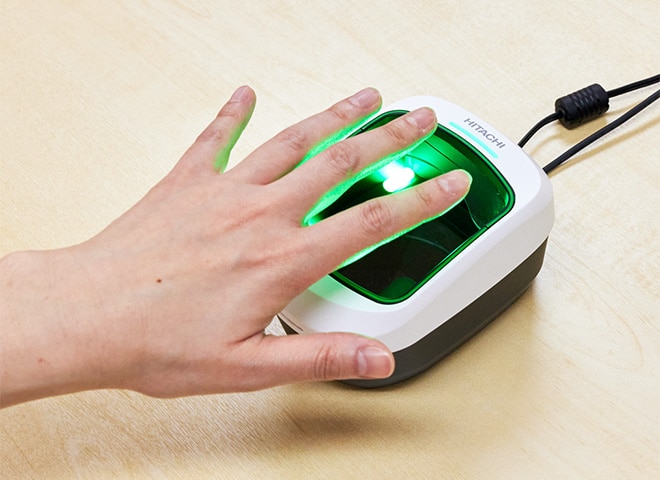Hitachi and Panasonic to Provide Cutting-edge Facial Recognition Service to Create a Secure and Convenient "Face Pass"
Jun. 30, 2023
Daishi Kawabata
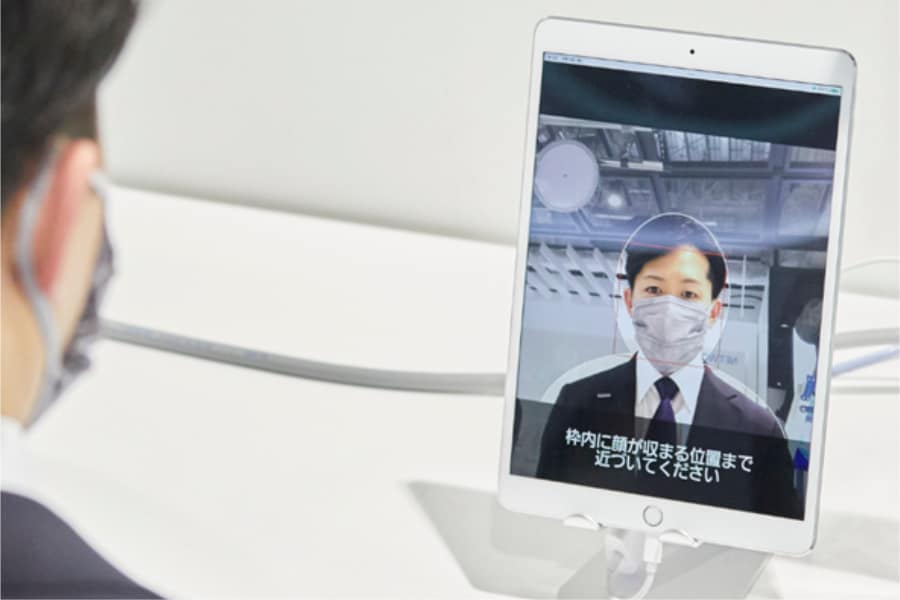
As digitalization in society becomes increasingly widespread, opportunities are increasing to require personal authentication such as when paying for daily purchases and entering and exiting buildings. As it stands now, smart cards, passwords, and QR codes are the most-common methods of authentication, but biometric authentication, which identifies individuals by fingerprint, finger vein, face, or other characteristics, has grown significantly in recent years.
Biometric authentication is expected to be introduced in a variety of settings in the future because of its strictness at identifying individuals and ease of use. On the other hand, in order for biometric authentication to spread widely, a system with higher authentication accuracy than now and an infrastructure that can securely manage biometric information is needed.
Hitachi, Ltd. and Panasonic Connect Co., Ltd. have thus collaborated to meet these needs by developing a new service that combines Hitachi's technology for preventing biometric data leakage with Panasonic Connect's facial recognition technology. This article was written based on interviews conducted with representatives from both companies.
Facial recognition technology rated as the best in the world

Panasonic Connect is a world-leading facial recognition technology company, and its facial recognition technology was rated the best in the world by the U.S. National Institute of Standards and Technology (NIST) in November 2022.
Mr. Shunsuke Osumi, a member of the company's Public Service Marketing Department, says the following about his company's technology:
"Japanese passports are valid for up to 10 years, during which time an individual's face changes as they grow or age. Our technology has a major feature in that it can recognize an individual with a high degree of accuracy even as they age. In tests conducted by NIST, our technology was rated highly, not only for frontal facial recognition, but also for recognizing faces from the side and diagonally.”
Biometric authentication technologies that will be familiar to most people include fingerprint authentication used in smartphones and computers and finger vein authentication used for ATMs at financial institutions. Facial recognition, however, is characterized by its ability to identify a person without using their hands or the need for them to touch the authentication device. Mr. Osumi believes that facial recognition will spread further in the future, in major part due to worldwide recognition of the importance of contactless identification as a direct result of the COVID-19 pandemic.
The company's facial recognition system has been installed in more than 200 facial recognition gates at the immigration gates of major airports in Japan. Moreover, the system has been adopted in a variety of fields, including medical institutions and pharmacy chains across Japan, as a card reader with facial recognition that supports the My Number Card, which is an identity card in Japan.
PBI strongly prevents biometric data leakage
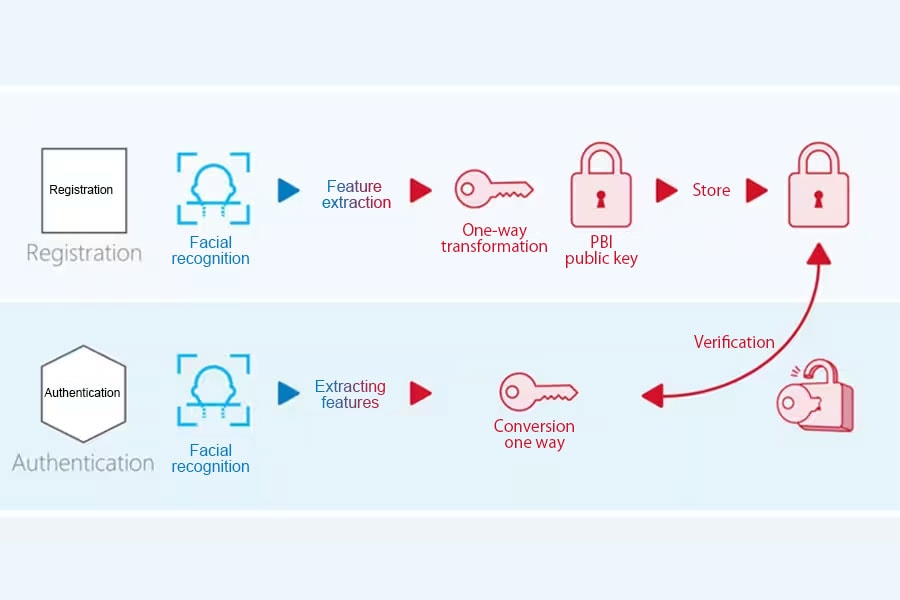
For biometric authentication to be used widely, it is essential that the infrastructure for managing and operating biometric data be hardened and secure. In this context, Hitachi has developed the Public Biometric Infrastructure (PBI), a biometric authentication infrastructure technology, ahead of its competitors.
PBI creates a "lock" and a "key" when biometric data is registered. The key is immediately deleted, and a key must be created and authenticated every time an individual’s identity is authenticated. Because this key cannot be created without biometric information of the identical person, there is no risk of the key being stolen and spoofed.

Takeyuki Mayumi, who promotes biometric authentication services leveraging PBI at Hitachi, said of the technology: "This is the world's most-advanced patented technology, and it can be used security and safety. The keyhole data can be deleted or updated. Therefore, even in the unlikely event that the keyhole data is leaked, the authorities have stated that it is not considered an actual leak."
There is a reason why Hitachi takes security and safety so seriously.
"In a questionnaire that we conducted last year on biometric authentication, more than one in four people use biometric authentication, and more than 80% of those surveyed said that security was the most-important factor for them. Therefore, we found that the general public wants security first and foremost, rather than authentication accuracy, speed, and ease of use, so we decided that security would be our top priority," said Mayumi.
Integrating PBI and facial recognition
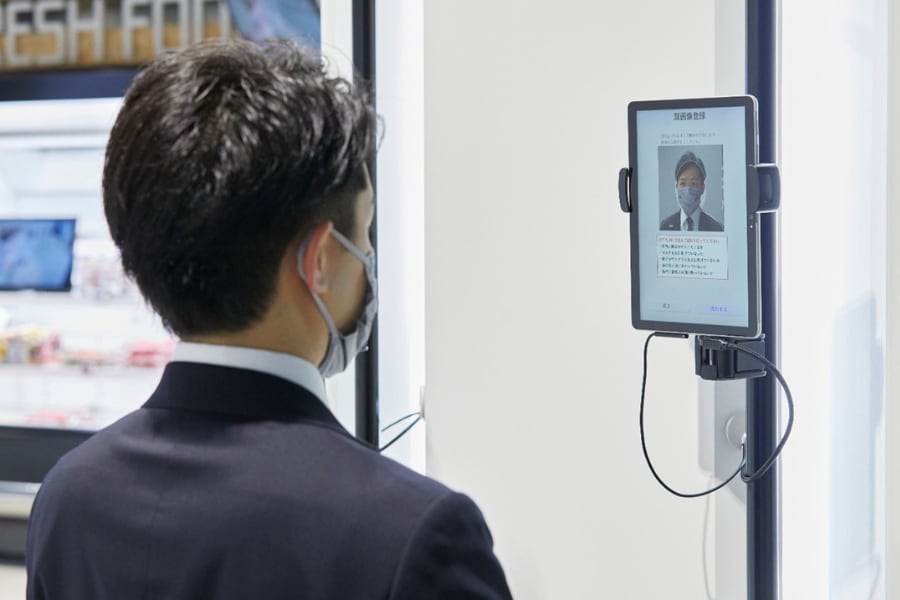
The development of a facial recognition service that takes advantages of the strengths of both companies—Hitachi's technology that encrypts biometric data (PBI) and Panasonic Connect's facial recognition technology—is in its final stages. Specifically, the service will use PBI to transform biometric data captured through facial recognition into encrypted data that cannot be recovered and to manage and verify the data in the cloud.
Mr. Osumi of Panasonic Connect has the following expectations about the collaboration between the two companies.
"Because face data is personal information, many customers are hesitant to introduce biometric authentication due to concerns about the leaking of unencrypted personal information. However, by using PBI, biometric data can be managed in an unrecoverable form, and we believe that this will provide the peace of mind that customers need to adopt biometric authentication. By combining our facial recognition with PBI, which is one of Hitachi's strengths, we will be able to offer high-value-added proposals, which will be useful for businesses in a variety of fields."
Meanwhile, Mayumi from Hitachi expressed his enthusiasm for future development as follows.
"Panasonic Connect's facial recognition provides not only a hardware but also a software that enables registration and authentication with a smartphone as long as it has a camera. Therefore, by linking to PBI, I believe that in the future this system can be used not only in the real world but also in the metaverse. We would like to develop a system that can handle individual authentication in various settings such as avatar authentication and payment."


